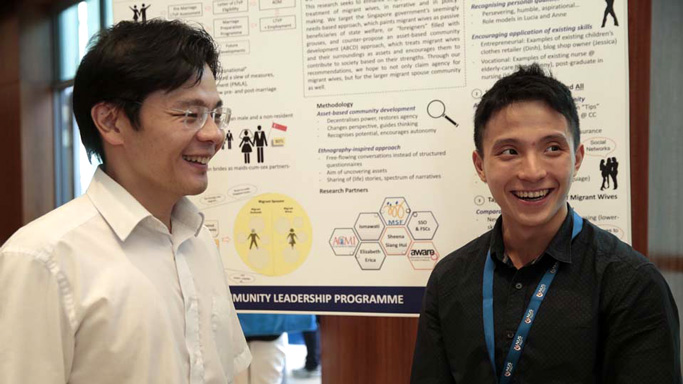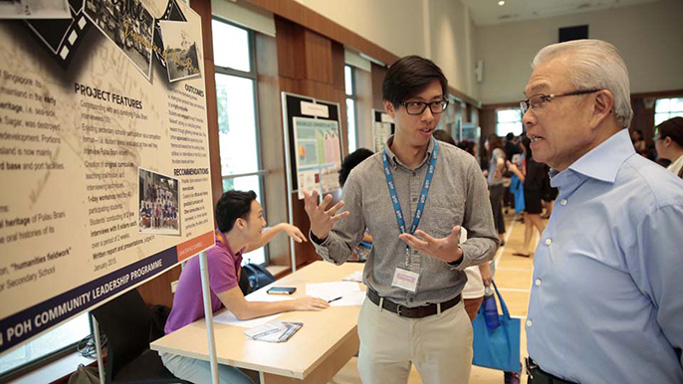Singapore's Change-makers
This article was first published on 23 April 2015 in NUS News at http://news.nus.edu.sg/highlights/8872-singapore-s-change-makers.
Published: 24 April 2015
We are proud that five of the seven student presenters at this symposium are our very own USP students, namely Alfred Wan, Goh Wei Leong, Kurt Tanyu, Tang Wai Hong and Darrell Lian.

Guest-of-Honour Mr Wong (left) with Alfred who did a study of foreign spouses in Singapore (Photo: James Hii)
Cancer survivors; treatment of foreign spouses; licensed moneylenders — these were some of the topics discussed during the Chua Thian Poh Community Leadership Programme (CTPCLP) Symposium held on 14 April at University Town. Into its fourth year, the annual symposium showcases student research and social innovation projects that touch on pressing community issues in a bid to drive awareness, address challenges and inspire collective action.
This year’s symposium saw five student presentations which married real data with sound policy recommendations. Some of these projects involved attachments with organisations like the Telok Blangah Constituency, Social Service Office @ Queenstown and the Singapore Cancer Society. “Even if we understand that policy-making entails a broader perspective, we should never neglect the human element in policy, which is what I got from all the groups…policy is very much about what we do on the ground,” said Mr Lawrence Wong, Minister for Culture, Community and Youth, and Second Minister for Communications and Information, Guest-of-Honour at the event.
One of the presentations focused on foreign spouses in Singapore. Conducted by Alfred Wan, a Year 4 Political Science major and Goh Wei Leong, a Year 3 Business major, the study examined how migrant wives are commonly painted as ‘needy’ beneficiaries of state welfare or disgruntled foreigners. Alfred and Wei Leong proposed a bottom-up approach which treats migrant wives as assets, allowing them to use their strengths to contribute to society and assimilate more quickly. The project is useful given that three in 10 marriages here are transnational (between a Singaporean and non-Singaporean). It gave the team greater insight into the nuances of citizenship and labour policies in Singapore.
Another project titled “Project Scribe” by Year 4 History major Darrell Lian documented the oral histories of the former residents of Pulau Brani, a southern island off the coast of Singapore soon to be reclaimed as part of the Marina Bay expansion. Darrell worked with secondary school students to capture the residents’ stories, while building up the students’ research skills and promoting interaction with the elderly. The project reminded him of the beauty of mankind’s commonalities and differences. “It further adds to the organic remembrance of our nation but also the sub-communities within the nation,” added Darrel.
The other three projects dealt with elderly communities residing in high-rise environments; rehabilitation needs of cancer patients and survivors; and experiences of licensed moneylenders.

Mr Chua (right) finding out more about Darrell’s research on the former residents of Pulau Brani (Photo: James Hii)
The CTPCLP, made possible by a pledged gift of $5 million from Mr Chua Thian Poh, Chairman and Chief Executive Officer of Ho Bee Investment Ltd., aims to develop Singapore’s next generation of community leaders.
Each year a small group of students from various disciplines are asked to conduct a research project on a community issue while being attached to a social organisation. They critically examine an issue, evaluate existing public policies and propose alternative solutions. “We make a conscious effort to not only look at needs…but also be very mindful of the assets, the resources, the strengths that already exist within the community…[and] seek solutions that can harness those assets,” said Associate Professor Albert Teo, Deputy Director of the University Scholars Programme and Head of the CTPCLP. “Only then can we help communities to empower themselves. So it’s really about encouraging collective self-help,” he added.

